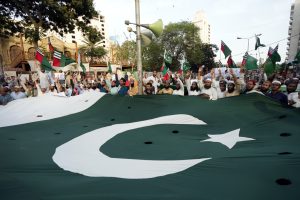Terrorism is a label of convenience that some state actors have (ab)used arbitrarily against their political opponents, armed or otherwise, to maintain their stranglehold on power.
Although violence against non-combatants for political and ideological goals is considered terrorism, each state has defined it in the context of its own peculiar security environment, leaving room open for manipulation. The vagueness of the concept–-the international community is yet to reach a consensus on its definition—has given states tremendous leeway to not only decide who is a terrorist but also formulate sweeping counterterrorism laws in the name of security and weaponize them against dissenting political groups.
For instance, anything that is anti-state or seditious can be framed as an act of terrorism and suppressed through counterterrorism laws. Governments are also pressing terrorism charges against their political rivals and opponents, even as they allow obviously extremist outfits to operate unhindered.
This has been the experience of Pakistan, as well.
While the Pakistan deep state continues its flirtations with radical religious groups like the neo-Barelvi Tehreek-e-Labbaik Pakistan (TLP) and the Deobandi Ahl-e-Sunnat Wal Jamaat (ASWJ), the new name of the anti-Shia militant outfit, the Sipah-e-Sahaba Pakistan (SSP), it has been quick to adopt counterterrorism laws to stifle political dissent, silence critical voices and suppress defiant civil society activists.
The manner in which anti-terrorism laws are being used against the opposition Pakistan Tehreek-e-Insaf (PTI), the party of former Prime Minister Imran Khan is illustrative.
Since April last year when Khan’s government was ousted in a parliamentary no-confidence vote, PTI leaders and workers have been charged under sedition and counterterrorism laws for attacking state symbols, installations, and properties.
Since March this year, dozens of PTI leaders, including Khan, have been charged with terrorism offenses among others, for ransacking the premises of the Pakistan Judicial Complex during Khan’s court appearance, and for attacking government authorities.
This trend gained momentum after May 9, when Khan’s supporters went on a rampage across the country, attacking even state installations, following his brief arrest by the paramilitary Punjab Rangers, and subsequent release by the Supreme Court.
In the aftermath of the May 9 incidents, the government has prepared a list of 25,000 PTI workers using geofencing, video and CCTV footage and WhatsApp surveillance. Around 10,000 of them have been arrested for their direct involvement in attacking government and military properties. Reportedly, the government intends to try 800 of them in the military and anti-terrorism courts under the Pakistan Army Act 1952 and the Official Secret Act. Pakistan’s sweeping counterterrorism laws allow security agencies to arbitrarily arrest and question “terror” suspects without the court’s approval.
The PTI is at the receiving end of sedition and counterterrorism laws today. However, it was during its hybrid rule between 2018 and 2022 that the trend of booking journalists and civil society workers under anti-terror laws was set in motion. In 2019 alone, more than 60 journalists were charged under anti-terror laws in Pakistan. A well-known broadcast journalist Nadeem Malik was served a notice under anti-terror laws on July 2, 2021, for some critical anti-government remarks.
Incidentally, Siddique Jan, who is considered to be pro-PTI, has been booked under the same laws for inciting riots during Khan’s court appearance on March 20 this year.
It is convenient for the state and expedient for the Pakistan Democratic Movement (PDM) government to suppress Khan and his party using sedition and anti-terror laws. However, this can be expected to have serious long-term consequences for Pakistan’s democracy, the rule of law and the country’s credibility in fighting terrorism.
For starters, it makes for poor optics. When Pakistan’s largest and most popular party is being systematically dismantled under the cover of sedition and terror offenses, notorious extremist outfits like TLP and ASJW are running amok on Pakistan’s streets holding pro-military and anti-PTI rallies.
Second, political developments in Pakistan are not organic but arranged with active inputs of the deep state. The shelf-life of these political arrangements is one election cycle, after which the deck is rearranged. So, any of the eleven political parties that are part of the PDM dispensation could face similar consequences.
Furthermore, the PDM’s political expedience is at odds with its lip service to the cause of civilian supremacy and upholding the rule of law. Despite their irreconcilable differences with PTI, the PDM parties should have supported the democratic principle that workers, leaders and activists of a political party must be given their due rights for fair and transparent trials in civil courts, instead of rubber stamping the state’s decision to put them on trial in military courts.
Finally, the exploitation of counterterrorism and sedition laws for dismantling PTI will further strengthen the state’s propensity to use them against dissenting and critical voices to the detriment of democracy and the rule of law in Pakistan. The fragile democratic process in Pakistan has regressed significantly, and existing divisions in the political landscape will keep it prone to manipulations and soft interventions in the future as well.
Ironically, while the PDM parties opposed PTI dispensation for being a hybrid regime, they have become part of the same hybrid experiment. Unfortunately, Pakistan’s political evolution continues to move in circles where faces and characters change but the script of divide and rule remains the same.

































